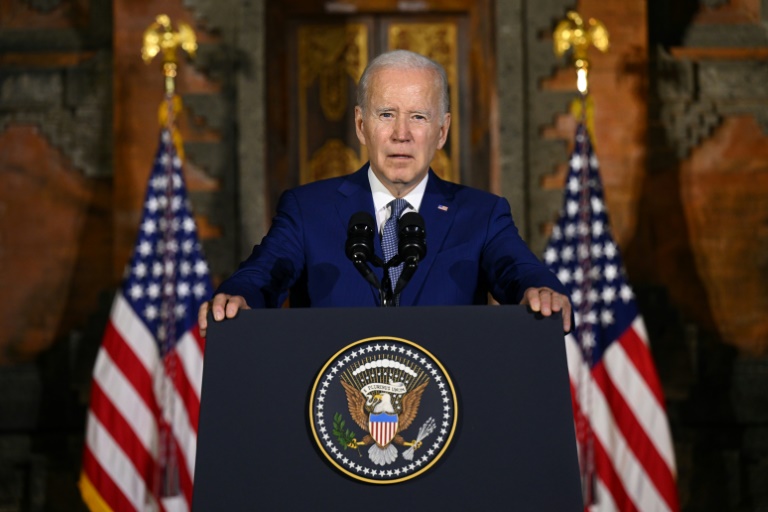US warns deadly actions against Iran-backed groups in Iraq, Syria

Baghdad – Washington has warned of “multiple actions” against Iran-backed groups in Iraq and Syria in retaliation for a drone strike in Jordan that killed three US troops.
AFP looks at the groups and targets potentially in Washington’s crosshairs after the first fatal attack on US forces in the region since the Israel-Hamas war broke out in October.
The White House has blamed the Islamic Resistance in Iraq for Sunday’s attack on Tower 22, a remote frontier base in Jordan’s northeast near the border with Syria.
The Islamic Resistance in Iraq, a loose alliance of pro-Iran fighters, opposes US support for Israel in the Gaza conflict and calls for the withdrawal of US troops stationed in Iraq as part of an international coalition fighting remnants of the Islamic State jihadist group.
The Pentagon has said the unclaimed Jordan attack had the “footprints” of Kataeb Hezbollah, or the Hezbollah Brigades, an Iran-backed Iraqi militant group and a key member of the Islamic Resistance in Iraq.
Two other groups have publicly announced their adherence to the alliance: the pro-Iran Al-Nujaba movement and the Kataeb Sayyid al-Shuhada.
Classified as “terrorists” by Washington, the groups are also affiliated with Hashed al-Shaabi, mainly pro-Iran former paramilitaries now integrated into Iraq’s armed forces.
The Islamic Resistance in Iraq has claimed dozens of drone and rocket attacks against US troops deployed in Iraq and Syria as part of the international anti-jihadist coalition.
US and coalition troops in the region have been attacked at least 165 times since mid-October, according to a US defence official.
In recent weeks, Washington has targeted Kataeb Hezbollah and the Al-Nujaba movement, including with a strike in the Iraqi capital that infuriated Baghdad.
Strikes have targeted the Jurf al-Sakhr district, a militarised zone around 60 kilometres (more than 35 miles) south of Baghdad largely controlled by pro-Iran factions.
Al-Qaim, near the border with Syria’s eastern Deir Ezzor province in an area where Iran-backed groups hold sway, has also come under US attack.
Riad Kahwaji, head of the Institute for Near East and Gulf Military Analysis, said the United States had “plenty of options” for strikes in Iraq, adding that Washington would likely target weapons depots and drone launch sites.
In Syria, he said he expected Washington to target Iraqi border areas where groups from the Islamic Resistance have their “biggest concentration”.
Mayadeen and Albu Kamal in Deir Ezzor province “are the biggest two bases which I expect to see hit,” he added.
Rami Abdel Rahman, head of the Syrian Observatory for Human Rights, a war monitor, also said Iraqi armed groups’ positions in Deir Ezzor, including Mayadeen and Albu Kamal, could be targets.
He also pointed to the Palmyra desert region in central Syria “where there are airports for launching drones”.
Pro-Iran fighters have evacuated bases and positions in eastern Syria, while “many officers from Iran’s Revolutionary Guards have withdrawn to Damascus”, added Abdel Rahman, whose organisation has a wide network of sources inside Syria.
In Iraq, an official from a pro-Iran faction, requesting anonymity for security reasons, told AFP in response to “American threats”, armed groups had “moved some equipment and left some military bases for other positions”.
Another factional official, also requesting anonymity, said “some commanders on the ground” had gone to Iran, while others were hunkering down in “safe positions”.
Although Washington has promised a response, officials have said the United States does not want war with Iran, where officials have sought to distance themselves from the Jordan attack.
This week, Kataeb Hezbollah said it would halt its attacks on US troops and urged its fighters to “use passive defence (temporarily), if any hostile American action occurs towards them.”
Apparently seeking to clear Iran of responsibility, the group said Tehran often objected to “the pressure and escalation against the American occupation forces in Iraq and Syria”.
On Thursday, Barbara Leaf, US assistant secretary for Near Eastern affairs, said the attacks by Iran-backed groups were “an assault on the sovereignty of Iraq”, its arms control and its foreign and national security policy.
“We’d like to see more action” by the Iraqi state to rein the groups in and hold those responsible to account, she added.
But on Friday, the Al-Nujaba movement said it intended to press on with attacks on US troops in the Middle East, warning that “any (US) strike will result in an appropriate response.”
